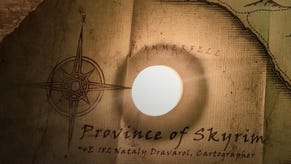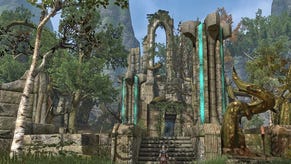The Elder Scrolls Online: Tamriel Unlimited review
Everybody wants to rule the world.
I dread to think how much time I've devoted to The Elder Scrolls over the years.
I've loved each game in the series, always grateful for the chance to rekindle my still-potent childhood fantasies of stepping into a medieval world where magic and steel were in a constant battle against the forces of darkness. Not just to engage in that battle, but to breathe in the world that was at stake, to visit the blacksmiths, the taverns and towns.
The Elder Scrolls was the first game to truly make that happen and I've spent hundreds of hours in each entry as a result. Totalled up, that's several months of my life immersed in the world of Tamriel in one way or another. So why is it that the first dozen hours of The Elder Scrolls Online felt like such a joyless slog?
The good news is that the game improves drastically once you get past the lengthy opening sections. For one thing, once you've ploughed through the first two or three areas, you start getting much larger maps to explore. Regions are still fairly self-contained - and depend on which alliance you've chosen - but you finally get a taste of the freedom that has defined the series.
More importantly, if you've been diligently doing all the quests rather than hurrying to the next location like a giddy goose, it's also around this point that you'll hit Level 10, which is when the game decides that you've earned the right to try something different.
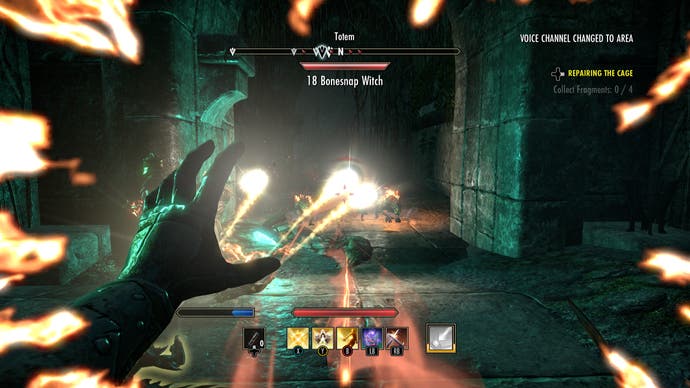
That would be the Alliance War, a persistent online military campaign in which you fight for whichever faction you chose at the character creation stage. You're taken to the centre of the world map, in the heart of Cyrodiil, where large scale PvP battles take place. It's not just a case of everyone running around, battering each other with swords and spells. It's a far more tactical undertaking, involving the capture and defence of forts and supply lines, which in turn allow fast travel across more of the map. Siege weapons must be used to breach forts, and tactical teamwork is a must.
That's not to say you have no say in what happens. There are four types of mission available to you, including the obvious huge pitched battles but also catering for those who prefer to go lone wolf with reconnaissance sorties and sabotage operations that simply ask you to kill a certain number of enemies, whenever and however you please.
Progress in this mode has its own rewards, with skill trees that carry over into the main quest line and perks that take the classic leaderboard idea and give it a regal twist, crowning the best player as the Emperor. Yet even if you never get within spitting distance of that accolade, it's still a thrill. Charging into battle alongside others, each wielding a unique set of armour, weapons and abilities, is something that is still recognisable as The Elder Scrolls, using the same lore and language, but plays in a way that is different and refreshing. Here, finally, is warfare on a scale that Tamriel's landscapes deserve.
It's revelatory, and a far more interesting take on the idea of online Elder Scrolls than the clumsily structured solo-but-not-really quest that makes up the bulk of the game. That makes it even more bizarre that the Alliance War is so buried, both in terms of the time needed to unlock it, and in the way that up until that point its existence is barely acknowledged, outside of cryptic loading screen hints. What should have been the core component of something called The Elder Scrolls Online is treated like a secret, optional side dish.
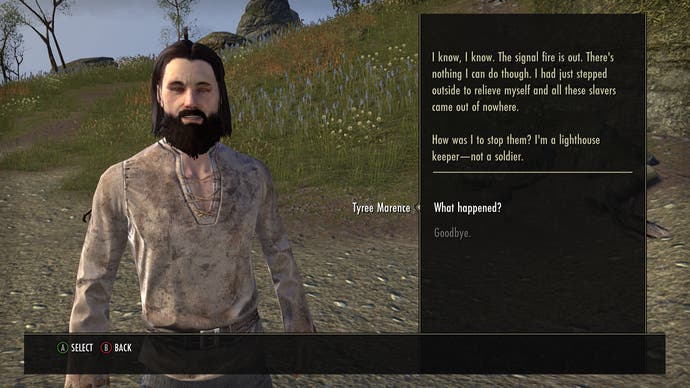
The main quest line does find its rhythm eventually, but it remains awkward and is never particularly interesting, while the decision to frame everything just like a typical Elder Scrolls story, but with hundreds of adventurers all following the same story simply doesn't work.
While you may find yourself fighting alongside other players by virtue of being in the same place at the same time, the amount of content for dedicated groups feels slim, with a couple of group dungeons on each map area. Right now, console players don't really seem to know what to make of this system, with very little voice chat and even less coordination, so if you're serious about going full co-op I'd recommend doing it with reliable real life friends rather than random in-game hook ups.
Mostly, my issue with the multiplayer aspect is how poorly integrated it is with both the story and the world. In previous Elder Scrolls stories, I felt like I was diving into a fully realised and inhabited place. Every house told a story, every character was a potential adventure and every object could be picked up, stolen, sold, used in some way.
In Tamriel Unlimited, I feel like I'm gliding over the surface of the world, but never really interacting with it. The fact you can't sleep, can't sit down, can't buy a home and must store all your spare gear in a limited bank vault is a large part of the problem. You're rootless, transient, existing only to quest, constantly and endlessly, as a slave to the grind.
The illusion shatters when those quests then get tangled up with other players, as when a character insists you are the first person to set foot in some sacred location in a thousand years, even as seven other people are hopping around behind you. Or when you stumble across someone fighting a boss, which you must then wait and trigger yourself, or when enemies suddenly break off from combat, their health gauge refills and they evaporate, summoned back to their starting positions for the benefit of another player.
It's more like being in a Westworld-esque theme park, experiencing a thinly veiled fantasy the mechanics of which are distractingly exposed whenever you see the gears and cogs whirring away to accommodate dozens of "Chosen Ones" at the same time.
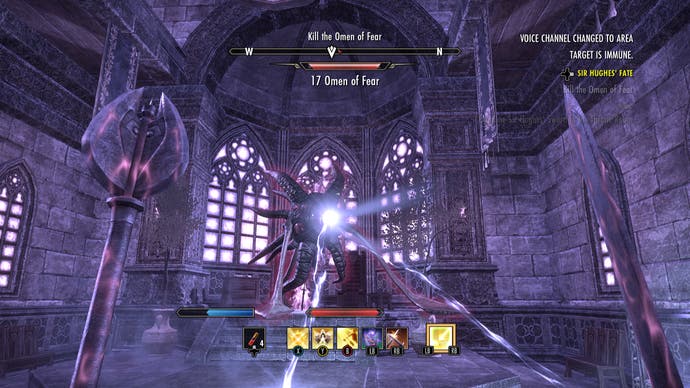
Where the game does go deep, the result is impressive. Crafting is a game unto itself, with multi-layered research and creation options blossoming the more time you spend on each discipline. This enables entrepreneurial players to produce goods to meet demand, either responding to in-game requests via town bulletin boards, or selling their wares to other players via Guild merchants.
Character creation, too, is a gift that keeps on giving. It's not just that you get plentiful options at the start of the game, but that your character keeps accruing possible evolutionary paths, as each new allegiance adds another skill tree, which in turn grows and morphs the more points you pump into it. This is a game where character diversity is evident right from the start, with no two players looking or behaving the same.
It's these hooks, rather than the drab storylines, that drew me in. Once I got past the 30-hour hump, when the game's early linearity was at its most stifling and The Witcher 3 kept calling me back, I found myself making a grudging sort of peace with The Elder Scrolls Online. It wasn't sparking any of the passion I hold for the series, but the simple and short "collect four things" and "go and talk to this person" quests slip down easily, and give it a momentum that can become hypnotic. Admittedly, I often didn't even bother to pay attention to who I was helping or what, precisely, I was expected to do, but there's an unmistakable satisfaction in following quest markers and seeing your level increase.
Like most MMOs, it wants to keep you on the hamster wheel, so it's not a hard game, even if you don't find yourself fighting alongside other players. Enemies are mostly levelled to be slightly weaker or slightly stronger than you, and if you've leaned heavily on any single attack it will level up enough that only the occasional boss fight will force you to rely on potions and healing spells. Mostly, combat is as much of a grind as the quests themselves, especially in areas heavily populated with constantly respawning cannon fodder foes. Blitzing through them is easy, but time consuming, and since few enemies require any real tactics beyond spell-spamming and aggressive slashing, getting from place to place can be a chore.
In technical terms, the early connection problems are seemingly beaten, but that doesn't mean the game isn't still prone to booting you back to the start screen for weird and random reasons. It's not common enough to be a serious issue, but it still happens enough to be irritating.
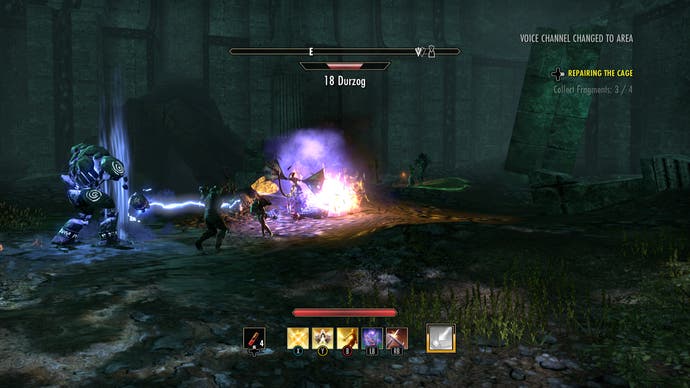
More problematic are some notable gameplay bugs which are still unaddressed. One involves invisible NPCs, where you can see their name but the character hasn't loaded in. You can't interact with them, and over time this means multiple quests can't be completed, as characters vanish. A hard reset, unplugging the console and rebooting, sorts this out temporarily but it will recur. According to the game's official support thread, this issue will be "improved" in the next patch.
The other problem involves invisible and intangible enemies, which nevertheless can deal damage to you. Sometimes you're able to run away from these glitched aggressors, but sometimes they'll kill you. To make matters worse, they don't disappear when you respawn, so if you encounter this glitch while deep in a dungeon, you're pretty much screwed. Bite the bullet, quit out and start over.
Those are the worst of the technical problems, and while Elder Scrolls fans have come to expect a certain level of wonkiness, it's still disappointing how prevalent and intrusive these issues are, right from the start of the game.
I'm now at a weird point in my relationship with Tamriel Unlimited. I've grown to quite like it, but I'd hesitate to say I was "having fun". I wonder how much of that is down to the fact it plays like a diet version of the solo Elder Scrolls games I love so much. I suspect I'll keep returning to it, on and off, which is something I didn't think would happen during those sluggish first few days of play, but it won't take much to pull me away from it either.
It doesn't make a particularly compelling case for MMOs on console, but then it often seems overly cautious about being an MMO in the first place, clinging to the systems and structures that defined the series while forcing players to share stories that never address their laughable surplus of protagonists.
For fans eager for a new fix all these years on from Skyrim, that may well be enough. The ability to share the adventure, somewhat clumsily, with friends is both a selling point and a pitfall, but those who concentrate their efforts on the Alliance War will find the experience worthwhile.




